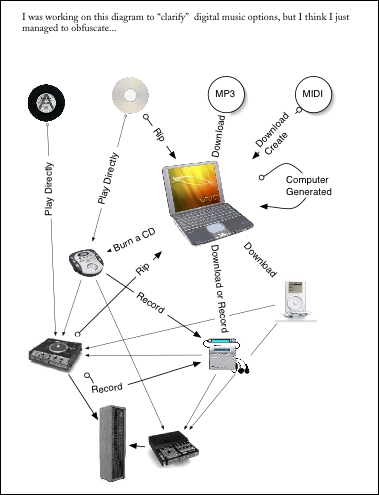| connection. After purchasing an MP3 online, you’re given a link to download the file. Currently, only Supreme Audio is selling MP3s online, but Palomino is working on a delivery system. Non-standard square dance music: Some callers, including me, like to find music that wasn’t produced specifically for square dancing but that can be used for patter calling. Last year at CALLERLAB, Clark Baker put together a panel on this, featuring Jerry Jestin, Ted Lazotte, and John Sybalsky. The tape from this session is fun, both | for the music and the choreography. You can find non-standard music on CDs and MP3s. It requires some digging around and listening to lots of samples on the web. In addition to CDs and MP3s, you might also look at MIDI files. MIDI files are not sound files; they’re sequences of instructions for producing sound from your computer (think player pianos and piano rolls). Thus, the sound quality is dependent both on the sequencer (the person who created the MIDI file) and on | your sound card, just as how a piano roll sounds depends on the quality of the piano player who created the roll and on the player piano. There is a ton of free MIDI music on the web, but most of it is really bad. However, if you dig around, you might find some fun MIDI dance music. One more source is you. I know several GCA callers who have produced music for themselves. There’s software out there that purports to allow even the most non-musical of us to make music. I don’t know about that, but if you have some skill, use it. With MP3 distribution, you could even sell it. (Be sure to check on licensing if the music isn’t your own composition.) Output First, all of these output devices need an amplifier and speakers. The Hilton systems that many of us use combine a turntable (for playing vinyl) and an amplifier. Turntable: Plays vinyl records. Using records has three big advantages: ease of use, looping (record reset) and tempo control. The ease of use comes from the fact that each song is an individual unit, with lyrics attached (on the record jacket). Just grab it and throw it on the turntable. MiniDisc (MD) Player: Plays minidiscs (a small CD-like disk enclosed in a plastic case). Minidiscs are rugged and compact. Players range from extremely small to console models. New models (NetMD) allow rapid transfer of MP3 and sound files from a computer via a USB port. Ease of use: need to keep track of what song is on what disc and need some way of having lyrics. Looping: excellent--can achieve seamless loops by dividing patter records into three tracks and repeating the middle track. Tempo control: Console models have good | |||||||||||
 | |||||||||||||
| Digital Music - CALLERLAB Presentation March 2002 | Page | 2 | |||||||||||